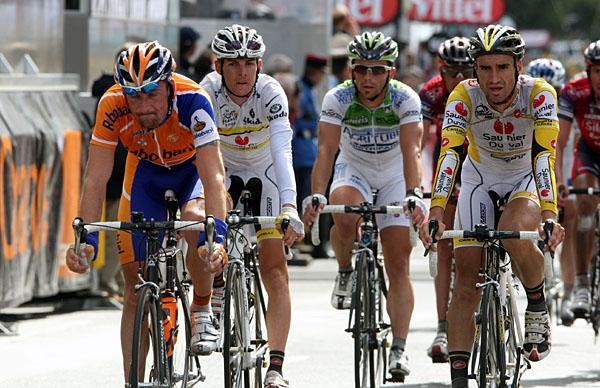Rabobank caught out on French wind and rain
By Brecht Decaluwé in Nantes A tricky descent 26 kilometres from the finish line in Nantes, after a...

By Brecht Decaluwé in Nantes
A tricky descent 26 kilometres from the finish line in Nantes, after a day of wind and rain in the Brittany countryside, has caused severe damage in stage 3. When the almost expected crash happened, Quick Step started to form echelons in front of the peloton. Our French colleague in the press room shouted, "ça va casser!", which basically means that the peloton would break into pieces. Which is exactly what happened, with three distinct, large groups fighting towards the finish.
The main victim of the split in the peloton was general classification contender Denis Menchov. The Russian team leader from Rabobank got stuck behind the crash. Despite the help from his own team-mates and the support from the Saunier-Duval team he never made it back to the front, losing 38 vital seconds.
Menchov obviously did not comment on the race, but other Rabobank people chimed in on the time loss from their leader. Directeur sportif Erik Breukink kept it short. "This shouldn't have happened, you've got to stick to your place," he said. "We told him so: at that corner you need to be up front." Erik Dekker, the other directeur sportif shared his opinion. "This is what I feared for," Dekker claimed. "The stress, the crashes. It's the weakest point from Denis, and today that showed."
When asked if he felt the gap was still reasonably small, Dekker responded, "Well, even if Denis rides well and keeps riding well I think the gaps [in the general classification] will be small. So I think 38 seconds is a lot" He pointed out what it was all about today. "It's not about how it happened, it's about the fact that you're behind the crash. You don't have to blame anybody, because it's about the strong and weak points of someone, but still it's something to be fed up with," Dekker expressed his deception.
Team-mate Bram Tankink explained in detail what happened in the dangerous descent. "It was very hard to stay together in that descent. Joost [Posthuma], Koos [Moerenhout] and Laurens [Ten Dam] were with him. Three hundred metres before the end of that descent he was still ahead of me. Then there was that corner to the left and he was suddenly 50 metres behind me. That's cycling. You're riding here with 200 riders who all want to be up front at that moment. Flecha and I immediately dropped back and then Sebastiaan [Langeveld] joined us later; then we started to pull to control the damages," Tankink said.
"We gave all we had, but it was the nine of us against all the others and that wasn't easy. It's a pity." When asked whether he felt Menchov made a mistake, Tankink protected his leader. "I don't think you should blame Menchov, because he gives all he has and he also knows that he should be riding up front. He's just not a 'wringer', he's not that type of rider. Sadly enough, that's just what you need to do in stages like this. It's something you can or something you can't [do], but you can't blame him for that," Tankink continued.
Get The Leadout Newsletter
The latest race content, interviews, features, reviews and expert buying guides, direct to your inbox!
As a team-mate Tankink knows Menchov quite well, but he couldn't predict how the Russian would react on this setback. "I don't dare to say how he'll react. Normally he's cool and very motivated, but this is a lot of time. If you look at it you would expect it would come as a hit. But we have to put ourselves over this as the Tour isn't over after today," Tankink concluded.
Australian Stuart O'Grady expressed what many riders must have thought. "I'm looking forward on getting out of this place. These are the sort of stages that never seem to end."